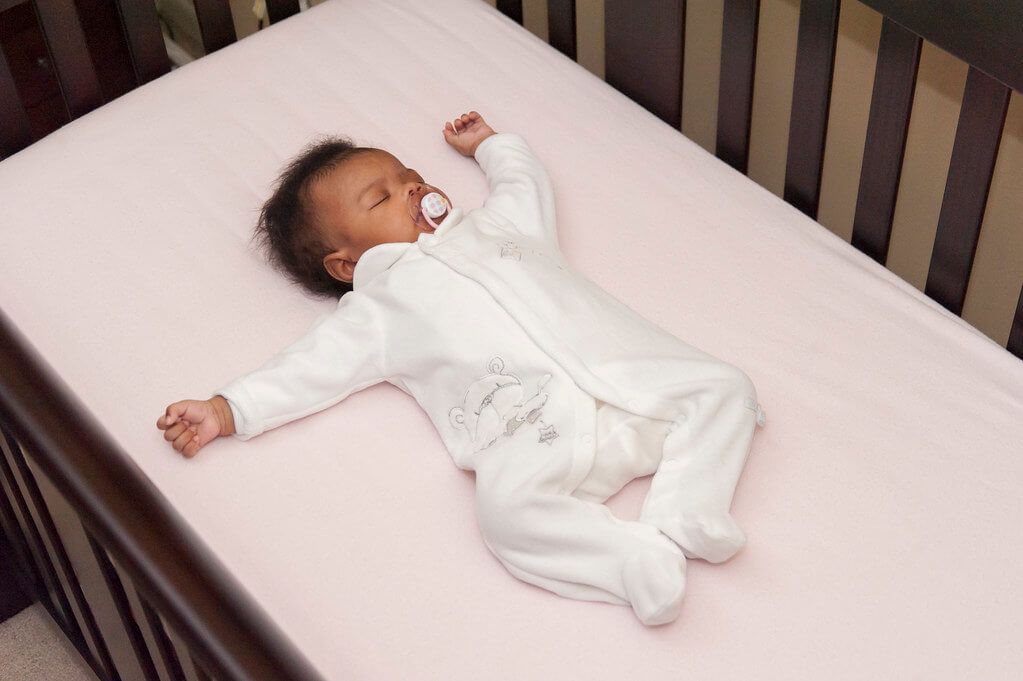Addressing baby reflux requires thoughtful considerations, and inclining a crib is a strategy gaining attention for its potential relief.
In this exploration, we delve into the significance of crib inclining as a remedy for baby reflux discomfort.
Understanding the nuances of reflux in infants and the impact of positioning during sleep is crucial for parents seeking effective relief measures.
Join us as we navigate the realm of inclining cribs, exploring its potential benefits in providing comfort to little ones dealing with the challenges of reflux during their early stages of development.
This article will discuss various methods to incline a crib for reflux relief. We’ll explore how to choose the right mattress inclination for reflux, the option of using foam wedges or mattress inserts, the benefits of crib wedges or mattress elevators.
Should babies with reflux sleep on an incline?
The question of whether babies with reflux should sleep on an incline is a topic that involves careful consideration. While some parents find inclining a crib beneficial in easing reflux symptoms, it’s crucial to consult with pediatricians.
Elevating the head of the crib can reduce acid reflux episodes, promoting better sleep for the baby.
However, safety measures must be paramount, ensuring that the incline is gentle, and the baby is secured appropriately.
Always use a pediatrician-approved sleep positioner or crib wedge. It’s essential to monitor the baby closely and seek professional guidance to determine the most suitable approach based on the severity of reflux and the individual needs of the infant.
Symptoms of Baby Reflux
Spitting Up:
A common symptom, infants with reflux may frequently spit up after feeding, sometimes accompanied by discomfort.
Regurgitation:
Beyond typical spit-up, regurgitation involves the effortless flow of stomach contents into the mouth, often leading to distress.
Arching Back:
Babies with reflux may arch their back during or after feeding, signaling discomfort and attempting to alleviate reflux symptoms.
Irritability:
Reflux can cause irritability, fussiness, and general discomfort, especially when lying down.
Difficulty Sleeping:
Disrupted sleep patterns, short naps, and difficulty staying asleep may indicate reflux-related discomfort.

Poor Weight Gain:
For some infants, reflux can impact feeding, leading to inadequate weight gain or even weight loss.
Coughing and Wheezing:
Refluxed stomach contents reaching the throat can cause coughing and wheezing, resembling respiratory issues.
Excessive Hiccups:
Frequent hiccups, especially after meals, can be a symptom of gastroesophageal reflux in infants.
Causes of Baby Reflux
Immature Lower Esophageal Sphincter (LES):
In infancy, the LES, a muscle at the base of the esophagus, may not be fully developed, allowing stomach contents to flow back into the esophagus.
Overfeeding or Incorrect Feeding Position:
Overfeeding can overwhelm a baby’s digestive system, contributing to reflux. Incorrect feeding positions, such as laying a baby flat during or after feeding, can exacerbate the issue.
Food Sensitivities:
Certain foods in a breastfeeding mother’s diet or ingredients in formula may trigger reflux in a sensitive baby.
Delayed Emptying of the Stomach:
Some infants may experience slower stomach emptying, causing a backlog of contents that can reflux.
Hiatal Hernia:
Although rare, a hiatal hernia, where part of the stomach protrudes into the diaphragm, can contribute to reflux in infants.
Neurological Factors:
Neurological conditions affecting the proper functioning of the digestive system can contribute to reflux.
Familial Predisposition:
A family history of reflux or gastrointestinal issues may increase the likelihood of an infant experiencing reflux.
How Inclined Sleep Can Help Baby Reflux
Inclined sleep can be a valuable strategy for alleviating baby reflux symptoms. Elevating the head of the crib or using a pediatrician-approved sleep positioner helps minimize stomach contents’ backflow into the esophagus.
This gentle incline aids in digestion and reduces the likelihood of discomfort associated with reflux. By promoting a more upright sleeping position, gravity assists in preventing regurgitation, allowing infants to rest more comfortably.
However, it’s essential to consult with a pediatrician before making any adjustments to a baby’s sleep environment to ensure safety and effectiveness in managing reflux symptoms.
How to Safely Incline a Crib for Reflux Relief
Safely inclining a crib for reflux relief involves mindful adjustments to promote comfort without compromising safety. Utilize a pediatrician-approved sleep positioner or wedge designed specifically for infant use.
Place the wedge under the crib mattress, ensuring a gentle incline of about 30 degrees. Opt for products with non-skid surfaces to prevent slipping. Regularly check the positioning of the wedge to maintain stability.
Avoid using soft materials or excessive padding that might pose a suffocation risk. Always secure the baby with a snugly fitted sheet and ensure the crib conforms to safety standards.
Consulting with a pediatrician before making any modifications is crucial to ensure the chosen method aligns with the infant’s specific needs and promotes a secure sleep environment.
What is the best position to hold a reflux baby?
The best position to hold a baby with reflux is upright, supporting their head and neck. Holding the baby in a slightly reclined position against your chest can help reduce the likelihood of reflux episodes.
The upright position aids in digestion and minimizes pressure on the lower esophageal sphincter, reducing the chances of stomach contents flowing back into the esophagus. Additionally, holding the baby in a semi-upright position provides comfort and relief from the discomfort associated with reflux.
Experimenting with various holding positions can help identify the one that provides the most comfort for the baby, and consulting with a pediatrician can offer personalized guidance based on the severity of the reflux and the baby’s individual needs.

Choosing the Best Mattress for an Inclined Crib
Selecting the best mattress for an inclined crib involves considerations for both comfort and safety. Opt for a firm and breathable mattress that provides ample support for the baby’s developing spine.
Ensure the mattress fits the crib snugly to prevent any gaps that might pose entrapment risks. Consider a waterproof mattress cover to protect against spills and accidents.
If using an incline wedge or sleep positioner, ensure it’s designed specifically for infant use, meets safety standards, and provides a gentle elevation. Regularly inspect the mattress for wear and tear.
Prioritizing safety and comfort ensures that the baby’s sleep environment promotes both peaceful rest and reflux relief. Consulting with pediatricians can offer additional guidance on selecting the most suitable mattress for the inclined crib.
Other Tips for Relieving Baby Reflux
Beyond inclined sleeping, several additional tips can help relieve baby reflux. Feed your baby smaller, more frequent meals to prevent overfeeding. Keep them in an upright position for at least 30 minutes after feeding.
Burp your baby regularly during and after meals to minimize air intake. Experiment with different feeding techniques, such as paced bottle feeding, to reduce the likelihood of gulping air.
Consider adjusting your diet if breastfeeding, as certain foods may contribute to reflux at night. Dress your baby in loose-fitting clothing to avoid unnecessary pressure on the stomach.
Regularly check and burp your baby during tummy time to facilitate digestion. Consulting with a pediatrician ensures a comprehensive approach to managing reflux, tailored to your baby’s specific needs.
When to See a Doctor About Baby Reflux
Seeking medical attention for baby reflux is crucial if symptoms persist or worsen. If your baby is consistently irritable, experiencing poor weight gain, showing signs of discomfort during or after feeds, or if reflux interferes with their sleep patterns, it’s time to consult a pediatrician.
Additionally, if your baby exhibits signs of respiratory issues such as persistent coughing or wheezing, medical evaluation is imperative. Prompt medical attention ensures a thorough assessment, accurate diagnosis, and tailored guidance on managing baby reflux effectively for your little one’s well-being.
Is It Bad to Sleep on an Incline Crib?
The question of whether it is bad for babies to sleep in an inclined crib is an important one. While inclining a crib can help alleviate reflux symptoms and promote better sleep, it’s essential to consider both this practice’s benefits and potential risks.

Reflux management
Sleeping on an incline can assist in managing reflux symptoms by using gravity to keep the stomach contents down. This can reduce discomfort and the likelihood of acid reflux episodes during sleep.
Improved breathing
Elevating the upper body can help open the airways and promote easier breathing for babies with nasal congestion or mild respiratory issues. This can be especially beneficial for infants who experience breathing difficulties while lying flat.
Safety considerations
While inclining a crib can provide relief, safety should always be the top priority. It is crucial to ensure that the crib is securely elevated and that there are no risks of the baby sliding or rolling to a dangerous position.
The crib mattress should be firm and fit snugly, without any gaps or spaces that could pose a suffocation hazard.
Please consult a healthcare professional
It’s important to consult with your pediatrician before inclining a crib. They can provide guidance based on your baby’s needs, health conditions, and potential risks or concerns.
Individual variations
Every baby is unique, and what works for one may not work for another. While some infants may benefit from sleeping on an incline, others may not find it comfortable or experience other issues.
Summary
In navigating the realm of baby reflux, it’s essential for parents to approach the journey with a blend of patience, vigilance, and informed decision-making.
From recognizing symptoms and understanding causes to exploring remedies like inclined cribs and other practical tips, the goal is to foster comfort for the little one.
Seeking medical advice when needed ensures a comprehensive and personalized approach to managing reflux. Every baby is unique, and so are their needs.
By staying attuned to your baby’s cues and collaborating with healthcare professionals, parents can navigate the challenges of baby reflux with confidence, promoting a peaceful and comfortable experience for both the baby and the family.


